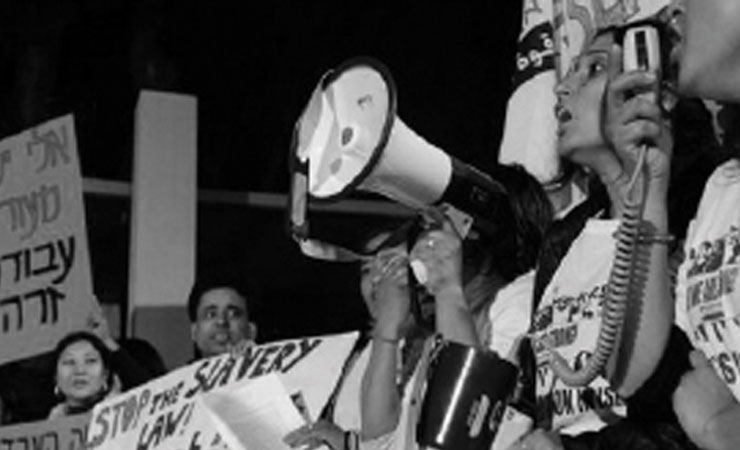Hanna Zohar, founder of “Worker’s Hotline,” talks about the difficulties facing two working asylum seekers in obtaining the rights due to every female worker in Israel.
25.12.2014
By Hannah Zohar
E. and A. are two young asylum seekers who came to the Worker’s Hotline offices for the first time just before they were due to give birth; when they requested that we ensure their rights from the National Insurance Institute for their expected births. Like all female workers employed in Israel, they are entitled, from the National Insurance Institute, to payment of hospitalization fees, a maternity grant, and maternity allowance.
E. has worked through a contractor in a large scale supermarket for three years, whereas A. has been employed in a bakery for three and a half years. Both women had told us that they did not receive any pay slips from their employers. We explained to the workers that in order to obtain their maternity rights, they must demand their pay slips, to which they are legally entitled, from their employers. After quite a few efforts on our behalf to convince the employers, E. managed to receive 6 pay slips, whereas A. received only two. Unfortunately, both employers chose to fake the initial date of employment to correspond with the date in which the slips were provided.
Luckily, E. and A. both gave birth to healthy children. They returned to our office several weeks after the births, one after the other, smiling and happy. With our help they asked to begin the bureaucratic proceedings against the National Insurance Institute. E. received half the maternity allowance due to her, since her employer gave her pay slips for only 6 months. A. on the other hand, did not receive any maternity allowance, since her employer only agreed to give her 2 pay slips. She became contented with the National Insurance Institute paying the hospitalization fees alone, since her husband had worked for 6 months up to the birth date.
The two workers asked us to fight for the rights to which they were legally entitled. We explained to them that in order to receive the maternity allowance from the National Insurance Institute for the period they had actually worked, we would have to sue their employers for the entire period and prove the actual duration of time they had worked. E. had time sheets from her work in the supermarket, but A. had no documentation – only work colleagues who were prepared to testify that she worked with them during the period she was claiming for.
We explained to the workers that the judicial process would be lengthy and exhausting. E. returned to work in the supermarket after consulting with us and without cancelling the filing of her suit. A. decided that she did not want to return to work.
On their recent visit to our offices to retrieve additional details about their work rights, they seem to have changed. After a long, difficult experience of fighting over their legally entitled rights against their employers and rigid bureaucratic systems, they smiled far less and were not as happy. The National Insurance Institute has not yet paid the hospital for A’s hospitalization fees, even though months have elapsed since the birth. In addition, the Ministry of Interior is refusing to renew the visa for her and her husband until the debt to the hospital has been paid. The husband’s employer informed him that if his visa is not renewed, they can no longer employ him.
The hospitals are synchronized with the Ministry of Interior and the system works efficiently and swiftly against the workers. It seems that while it is still a question of negating and preventing rights, the well-oiled wheels of bureaucracy operate faultlessly.
What remains is to only to be sorry that the enforcement and protection of female workers is not similarly synchronized within the system and that the protection of female workers’ rights is often further prolonged, and that demands from them take superfluous effort.
Translated by: Janet Henig


